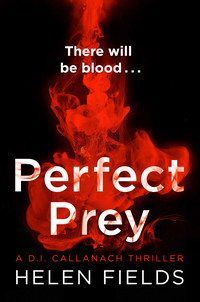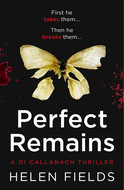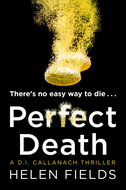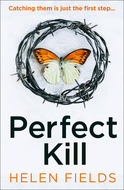Kitap dosya olarak indirilemez ancak uygulamamız üzerinden veya online olarak web sitemizden okunabilir.
Kitabı oku: «A DI Callanach Thriller»


Copyright

Published by Avon an imprint of
HarperCollinsPublishers Ltd
1 London Bridge Street,
London, SE1 9GF
First published in Great Britain by HarperCollinsPublishers 2017
Copyright © Helen Fields 2017
Cover photographs © Alamy
Cover design © Black Sheep 2017
Helen Fields asserts the moral right to be identified as the author of this work.
A catalogue copy of this book is available from the British Library.
This novel is entirely a work of fiction. The names, characters and incidents portrayed in it are the work of the author’s imagination. Any resemblance to actual persons, living or dead, events or localities is entirely coincidental.
All rights reserved under International and Pan-American Copyright Conventions. By payment of the required fees, you have been granted the non-exclusive, non-transferable right to access and read the text of this e-book on screen. No part of this text may be reproduced, transmitted, down-loaded, decompiled, reverse engineered, or stored in or introduced into any information storage and retrieval system, in any form or by any means, whether electronic or mechanical, now known or hereinafter invented, without the express written permission of HarperCollins.
Source ISBN: 9780008181581
Ebook Edition © July 2017 ISBN: 9780008181598
Version: 2020-10-29
Dedication
For Brian and John - the dads and grandads - reading their newspapers in the great beyond, and wondering what all the noise down here is about. With love from those who will never forget you.
Contents
Cover
Title Page
Copyright
Dedication
Part One
Chapter One
Chapter Two
Chapter Three
Chapter Four
Chapter Five
Chapter Six
Chapter Seven
Chapter Eight
Chapter Nine
Chapter Ten
Chapter Eleven
Chapter Twelve
Chapter Thirteen
Chapter Fourteen
Chapter Fifteen
Chapter Sixteen
Chapter Seventeen
Chapter Eighteen
Chapter Nineteen
Chapter Twenty
Chapter Twenty-One
Chapter Twenty-Two
Chapter Twenty-Three
Chapter Twenty-Four
Part Two
Chapter Twenty-Five
Chapter Twenty-Six
Chapter Twenty-Seven
Chapter Twenty-Eight
Chapter Twenty-Nine
Chapter Thirty
Chapter Thirty-One
Chapter Thirty-Two
Chapter Thirty-Three
Chapter Thirty-Four
Chapter Thirty-Five
Chapter Thirty-Six
Chapter Thirty-Seven
Chapter Thirty-Eight
Chapter Thirty-Nine
Chapter Forty
Chapter Forty-One
Chapter Forty-Two
Chapter Forty-Three
Chapter Forty-Four
Chapter Forty-Five
Chapter Forty-Six
Chapter Forty-Seven
Chapter Forty-Eight
Chapter Forty-Nine
Chapter Fifty
Chapter Fifty-One
Chapter Fifty-Two
Chapter Fifty-Three
Chapter Fifty-Four
Chapter Fifty-Five
Chapter Fifty-Six
Chapter Fifty-Seven
Chapter Fifty-Eight
Chapter Fifty-Nine
Chapter Sixty
Chapter Sixty-One
Chapter Sixty-Two
Chapter Sixty-Three
Chapter Sixty-Four
Chapter Sixty-Five
Chapter Sixty-Six
Chapter Sixty-Seven
Chapter Sixty-Eight
Chapter Sixty-Nine
Chapter Seventy
A Few Words on the Darknet
Keep reading for a sneak peek of The Shadow Man …
Acknowledgements
Keep Reading …
About the Author
By the Same Author
About the Publisher
PART ONE
Chapter One
There were worse places to die. Few more terrifying ways of dying, though. It was an idyllic summer backdrop – the cityscape on one side, the ancient volcano Arthur’s Seat silhouetted in the distance. The music could be felt before it was heard, the bass throbbing through bones and jiggling flesh. Sundown came late in Edinburgh in early July and the sky was awash with shades of rose, gold and burnt orange. Perhaps that was why no one noticed when it happened. Either that, or the cocktail of drink, drugs and natural highs. The festival was well underway. Three days of revellers lounging, partying, loving, eating and drinking their way through band after band, bodies increasingly comfortable with fewer clothes and minimal hygiene. If you could take a snapshot to illustrate a sense of ecstasy, this would have been the definitive scene. Washing through the crowd, jumping as one, as if the multitudes had merged to create a single rapturous beast with a thousand grinning heads.
Through the centre of it all, the killer had drifted like smoke, sinuous and light-footed, bringing a blade to its receptacle like a ribbon through air. The slash was clean. Straight and deep. The extent of the blood loss was apparent on the ground, the wound too gaping for hands to stem the flow. Not that there had been time to get the victim in an ambulance. Not that anyone had even noticed his injury before he had almost completely bled out.
Detective Inspector Luc Callanach stood at the spot where the young man had taken his last breath. His identity had not yet been established. The police had pieced together remarkably little in the hour since the victim’s death. It was amazing, Callanach thought, how in a crowd of thousands they had found not a single useful witness.
The young man had simply ceased his rhythmic jumping, crumpling slowly, falling left and right, forwards and backwards, against his fellow festival-goers, finally collapsing, clutching his stomach. It had annoyed some of them, disrupted their viewing pleasure. He’d been assumed drunk at first, drug-addled second. Only when a barefooted teenage girl had slipped in the pool of blood did the alarm ring out, and amidst the decibels it had taken an age for the message to get through. Eventually the screams had drowned out the music when the poor boy had been rolled over, his spilled entrails slinking closely in his wake like some alien pet, sparkling with reflected sunshine in the gloss of so much brilliant blood.
The uniforms hadn’t been far away. It was a massive public event with every precaution taken, or so they’d thought. But making their way through the throng, police officers first, then paramedics, and clearing an area then managing the scene, had been a logistical disaster. Callanach looked skywards and sighed. The crime scene was more heavily trodden than nightclub toilets on New Year’s Eve. There was enough DNA floating around to populate a new planet. It was a forensic free-for-all.
The body itself was already on its way to the mortuary, having been photographed in situ for all the good it would do. The corpse had been moved so many times by do-gooders, panicked bystanders, the police, medics, before finally being left to rest on a bed of trampled grass and kicked-up dirt. The chief pathologist, Ailsa Lambert, had been unusually quiet, issuing instructions only to treat the body with care and respect, and to move him swiftly to a place where there would be no more prying cameras or hysterical caterwauling. Callanach was there to secure the scene – a concept beyond irony – before following Ailsa to her offices.
In the brief look Callanach had got, the victim’s face had said it all. Eyes screwed tight as if willing himself to wake from a nightmare, mouth caught open between gasp and scream. Had he been shouting a name? Callanach wondered. Did he know his assailant? He’d been carrying no identification, merely some loose change in his shorts, not even so much as a watch on his wrist. Only a key on a piece of string around his neck. However swiftly death had come, the terror of knowing you were fading, of sensing that hope was a missed bus, while all around you leapt and sang, must have seemed the cruellest joke. And at the very end, hearing only screams, seeing panic and horror in the sea of eyes above. What must it have been like, Callanach wondered, to have died alone on the hard ground in such bright sunlight? The last thing the victim had known of the world could only have been unalleviated dread.
Callanach studied the domed stage, rigged with sound and lighting gear, and prayed that one of the cameras mounted there might have caught a useful fragment. Someone rushing, leaving, moving differently to the rest of the crowd. The Meadows, an expanse of park and playing fields to the south of the city centre, were beautiful and peaceful on a normal day. Mothers brought their toddlers, dog walkers roamed and joggers timed the circuit. Strains of ‘Summer is A-Coming In’ sounded in the back of Callanach’s mind from a screening of the original version of The Wicker Man that DI Ava Turner had dragged him to a few months ago. He’d found Edward Woodward’s acting mesmerising, and the images of men and women in animal masks preparing to make their human sacrifice had stayed with him long after the projector had been switched off. It wasn’t a million miles away from the circus in the centre of which this young man had perished.
‘Sir, the people standing behind the victim have been identified. They’re available to speak now,’ a constable said. Callanach followed him to the edge of the field, leaving forensics constructing a temporary shelter to protect the scene overnight. Leaning against a tree was a couple, wrapped together in a single blanket, their faces tear-stained, the woman shaking visibly as the man comforted her.
‘Merel and Niek De Vries,’ the constable read from his notebook. ‘A Dutch couple holidaying here. Been in Scotland ten days.’
Callanach nodded and stepped forward for quiet privacy.
‘I’m Detective Inspector Callanach with Police Scotland,’ he said. ‘I know this is shocking and I’m sorry for what you witnessed. I’m sure you’ve explained what you saw a few times now, and you’ll be asked about it many more. Could you just run over it for me though, if you don’t mind?’
The man said something to his wife that Callanach couldn’t follow, but she looked up and took a deep breath.
‘My wife does not speak good English,’ Niek De Vries began, ‘but she saw more than me. I can translate.’
Merel rattled off a few sentences, punctuated with sobs, before Niek spoke again.
‘She only noticed him when the girl screamed. Then Merel bent down to shake him, to tell him to get up. He was on his knees, bent forward. We thought he was drunk, sick maybe. When Merel stood up again her hand was covered with blood. Even then, she says, she thought maybe he had vomited, ruptured something. Only when everyone stepped back and we laid him out, did we see the wound. It was as if he had been cut in two.’ Niek put one hand across his eyes.
‘Did you see anyone before he fell, near him, touch him, push past him? Did anyone seem to rush away from the area? Or can you describe any of the people standing near you in detail?’ Callanach asked.
‘Everyone was moving constantly,’ Niek answered, ‘and we were watching the stage, the band, you know? We don’t have any friends here so we were not really looking. People were jumping up and down, screaming, going this way and that to get to the bar or the toilets. We were just trying not to get separated. I hadn’t even noticed the man in front of us until he fell.’
‘Did he speak at all?’ Callanach asked.
Niek checked that question with Merel.
‘She thinks he was already unconscious or dead when she first spoke to him. And anyway, the noise was too much. She would not have heard.’
‘I understand,’ Callanach said. ‘Officers will take you to the police station to make full written statements and then transfer you to your accommodation.’
‘Not British?’ Merel stuttered, addressing Callanach directly for the first time.
‘I’m French,’ Callanach replied, ‘well, half French, half Scottish. I apologise if my accent’s hard to understand.’
‘Le garçon était trop jeune pour mourir.’ The boy was too young to die, she said, continuing in French although Callanach found he was hearing it in English, so fast had his translation become.
Merel De Vries recalled one other thing. Above the music, a woman laughing in the crowd, so loud she could hear it even as she’d bent down to help the victim. What struck Callanach as odd was Merel’s description of it. That it wasn’t a happy laugh. In her words, it had echoed of malicious.
Chapter Two
‘The cut came from a single weapon, but the implement would have been customised by skilled hands,’ Ailsa Lambert said. ‘Two perfectly paired scalpel blades must have been bound together with a spacer between them creating a gap of four millimetres. The combination would have rendered the wound impossible to close or suture, even had he been in hospital when he’d been attacked. The twin incisions are …’ she paused as she picked up a flexible measure, ‘twenty-eight centimetres in length. They have pulled apart substantially, causing a gaping wound resulting in massive trauma. His organs then moved, sliding down and forward, so that much of what should have been in his abdominal cavity exited his body as he fell and rolled. Some of it even has identifiable shoe marks from those around him. Blood loss caused his heart to stop.’
‘I get it,’ Callanach said wearily. ‘Not much doubt over cause of death. Anything else I need to know?’
‘Tox screen will be a while. He has no other visible injuries, seems superficially healthy, his lungs tell me he wasn’t a smoker, good boy,’ she patted the corpse’s hand with her gloved one and smiled grimly. ‘But this weapon, Luc, this weapon wasn’t designed for self-defence. And you can’t pick it up at the hardware store either. Someone crafted it, adored it. The cut was deep, even, and yet very little force seems to have been required to puncture far into the abdominal cavity. Whoever did this took pride in it, thought about efficiency, understood the mechanics of it. This was no impromptu stabbing or weapon grabbed in the heat of an argument.’
‘An assassination then?’ Callanach asked, bending over the body and taking stock.
‘More like a ritual, if you ask me,’ she said. ‘This was dreamed up, practised and perfected.’
‘How old is he?’
‘Between eighteen and twenty-two, I think. Five feet, eleven inches. Active, no spare fat, good muscle mass but not one of those types who live at the gym. Size ten shoe. Brown hair, hazel eyes. No defence wounds. Never saw it coming.’
‘So he didn’t recognise his attacker as a threat when they came for him?’
‘Most unlikely. You don’t look well yourself, Luc. Are you sleeping?’ Ailsa asked as she peeled off her gloves and made notes.
‘I’m sleeping just fine,’ he lied.
‘Eating properly? You’re pale and you have broken blood vessels in your eyes.’
‘I’ll phone you tomorrow for the tox results,’ he evaded. ‘Anything before that and you have my mobile number.’
‘Give my regards to DI Turner, would you? I haven’t seen her for an age. I used to catch up with her mother regularly at an opera appreciation group but I haven’t bumped into her recently either,’ Ailsa said, stretching her back. In her mid-sixties, tiny and birdlike, she was a force to be reckoned with.
‘I’ll pass that on,’ he said, stripping off his own gown and dropping it into the bin outside the door.
On his return to the station, a grim welcome party sat around in the incident room. Callanach looked directly to Detective Constable Tripp.
‘Just following up a lead from a phone call, sir,’ Tripp said. ‘Young woman called in to say she and her boyfriend got separated at the festival. He hasn’t turned up yet. I’ve sent a car to pick her up.’
‘Did she give his name?’ Callanach asked, grabbing coffee as he sat at a computer.
‘Sim Thorburn,’ Tripp replied, pressing a couple of keys and waiting for a photo to load, one step ahead as ever. Some new social networking site popped up in seconds with a multitude of larger than life photos. In each one, the lad was smiling, laughing, his expression carefree and guileless. In the last, he was hand in hand with his girlfriend. Without a doubt, it was the same hand that Ailsa Lambert had been patting a short while ago.
‘That’s him,’ Callanach said. ‘So what do we know?’
‘At the moment, everything that’s on his home page. He didn’t bother with privacy filters, so it’s there for the world to see. He’s twenty-one, Scottish, lives in Edinburgh.’
‘Police record?’
‘Not that we can find.’ A phone rang behind Tripp and someone passed him a note. ‘The girlfriend’s here, sir. And DCI Begbie wants to see you as soon as you’re done.’
‘Of course he does,’ Callanach said, standing up. ‘Do you have any idea where DI Turner is, Tripp? Only Ailsa Lambert was asking after her.’
‘Off duty,’ DC Salter shouted from the corridor. ‘Said something about maybe being in late tomorrow too. Did you want me to get a message to her, sir?’
‘No thanks, Salter,’ Callanach shouted after her. ‘It’s nothing that can’t wait.’ Unlike Sim Thorburn’s girlfriend, no doubt already suspecting the worst but who’d be downstairs holding out for a miracle. She would be imagining some mistake, hoping perhaps that in spite of the evidence, her boyfriend had met some friends and wandered off without telling her. Any number of excuses for his disappearance would be going through her mind. Until she saw Callanach’s face, he thought. People knew the second they looked at you.
‘I’m sorry,’ he said, as soon as he saw her. Introductions were pointless. She wouldn’t remember Callanach’s name in a few seconds’ time, anyway.
‘You can’t be sure that it’s him yet,’ she whispered. ‘You haven’t even asked me about him.’
‘We found several photos on an internet site of the two of you together.’ He held out an example that Tripp had printed off in anticipation. ‘Is this Sim?’
She sobbed and took a step away from the photo as if the paper itself was a weapon.
‘Have you seen him?’ she asked. Callanach pulled a chair out for her and she sat.
‘I have. I’m sure it’s him.’
‘What … what …’ she couldn’t say the words.
‘He received a knife wound. It proved fatal. It would have been very fast. The ambulance didn’t have time to get to him.’
‘A knife wound? I thought maybe a ruptured appendix or a blood clot or … he was stabbed? It’s not him. No one would do that to Sim.’
‘He wasn’t in any trouble that you knew of? It might be something as simple as a family feud, money problems, someone settling an old score?’
‘Don’t be so stupid!’ the girl snapped. It was an understandable reaction given what she was going through. What she didn’t understand was how cold the trail would get with every passing minute. ‘He was a charity worker. He earned minimum wage and still spent every spare moment doing extra unpaid voluntary service.’
‘Can you tell me more about that?’ Callanach asked.
‘He worked in the homeless shelters, ran the soup kitchens in the city, organised fundraising. Sim was the gentlest, kindest person you could ever meet. He gave away every last penny. It was the only thing we ever argued about.’
‘And you didn’t see anything strange yesterday? No one following him?’
The girl shook her head, shock taking hold. Callanach knew he’d got all he was going to get from her by then. He handed over to Tripp to organise the formal identification of the body and obtain family details. Callanach had to get a lead, and fast. Somewhere, the man or woman who had slaughtered Sim Thorburn had undoubtedly already hidden the weapon and neutralised any incriminating forensic evidence.
‘Salter,’ Callanach shouted on his way towards the incident room. ‘Find out who’s controlling the footage from the concert. I want it available tonight. And try to keep the Chief off my back for a while, would you? I’ve got work to do.’
‘So have I, Detective Inspector,’ DCI Begbie said, appearing in the doorway. Lately he seemed larger every time Callanach saw him. It wasn’t healthy, putting on weight that fast. The Chief hadn’t been exactly slim when Callanach had joined Police Scotland, but now he was working his way towards an early grave, for no apparent reason. ‘Is something wrong, DI Callanach?’ Begbie asked. He realised he’d been staring at Begbie’s straining shirt buttons.
‘No, sir, just distracted.’
‘Frankly, that’s not very reassuring. What leads have we got?’ Callanach tried to find a way to express the completely negative nature of the case so far, and struggled to answer. ‘That good, huh? Well, somebody must have seen something. Thousands of potential witnesses and we’re stuck. Bloody typical. Have media relations organise a press conference. Might as well do it immediately. We can’t have people scared on the streets. There’ll be a rational explanation for this. No one walks up to a complete stranger and slashes them. Get answers, Callanach. I want someone in custody in the next forty-eight hours.’
‘Chief …’
‘Got it. You don’t like doing press conferences. Duly noted.’ Begbie walked off, puffing as he went. Callanach considered following to ask if his boss was all right, then recognised that for the career-ending move it would be and made his way back towards the incident room. He was starving, but the idea of a fish and chip supper being consumed straight from newspaper was making him queasy. There was no prospect of getting home for twelve hours and the healthiest food at the station was probably an out of date packet of crackers abandoned at the back of a cupboard. Callanach was getting his thoughts together to lead a briefing when someone thrust a carrier bag into his hand.
‘Stop looking at everyone else’s food as if they’re eating poison. It’s off-putting. You’re not doing anything to help your reputation for French snobbery,’ DI Ava Turner said, pushing a fork into his free hand. ‘Prawn salad. Not home-made, so you’re safe from my pathetic efforts.’
‘I thought you were off duty and not coming in until late tomorrow. Have you been demoted to the catering division?’
‘You can always hand it back,’ she said, checking her phone and frowning.
‘Too late.’ Callanach ripped open the packaging and tucked in. ‘Ailsa Lambert was asking after you. Do I take it that Edinburgh’s elite social circle is not functioning properly?’ he smiled.
‘How do you tell someone to shut up in French?’ she responded without looking up from her phone. Ava had spent much of her career trying to distance herself from the privilege she was born into. The expectation that she would become a doctor, lawyer, actuary or similar – at least until she settled down and produced grandchildren for her eager parents – had spawned a rebellion landing her in the grimy world of policing. But even at work she couldn’t escape the fact that her family’s closest friends included the upper levels of Police Scotland brass, politicians, CEOs and even the city’s chief forensic pathologist.
DC Salter interrupted, handing over two pages of A4 and checking her watch. ‘DCI Begbie said he knew you were busy so he’s organising the press conference for you.’ Salter was trying not to smile. Turner ruined the effort by laughing out loud. ‘I’ve written out some notes for you, sir. Media will be gathered in about an hour.’
‘Wow. Reduced to using the media circus already? This time tomorrow morning women will be swooning over your face on the front cover of every paper. So Police Scotland’s pin-up detective is getting back out there, is he?’ Ava said. Callanach had been with the Major Investigation Team in Edinburgh for eight months, and in that time Ava had never missed an opportunity to make fun of him. His distant career as a model made him a particularly easy target.
‘It wasn’t my idea,’ Callanach muttered. ‘Merde!’
‘Language,’ Ava admonished.
‘I thought you couldn’t speak French,’ Callanach said.
‘You’ve been mistaking my ignoring you for failing to understand you. It’s a different concept,’ Ava said.
‘Do you not have work to do?’ Callanach asked, shaking his head at her, watching the grin spread across her face. Ava was the sort of woman who left men wrong-footed. She looked innocent enough, her long brown hair a tangle of curls, with grey eyes that shifted colour depending on the light. But she could cut to the chase in a second. Being direct seemed to be the only way she knew. When he’d arrived from France his head had been a mess. Too much had happened for him to walk away unscathed emotionally. The last few months had been curative, and Ava had played a large part in that, mainly because with her he could just be himself.
‘Earth to Callanach,’ Ava said, waving her hand in front of his face. ‘I was only teasing. It’s that bad then? You’ve really got nothing to go on?’
‘Less than nothing,’ Callanach said.
‘DI Turner!’ Begbie shouted from the corridor.
‘I’m off duty, sir,’ Ava shouted back. ‘In fact, I’m not even in the building. You’re imagining me.’
‘Too bad for you I have such an active imagination. Get a squad over to Gilmerton Road. There’s been another murder.’






